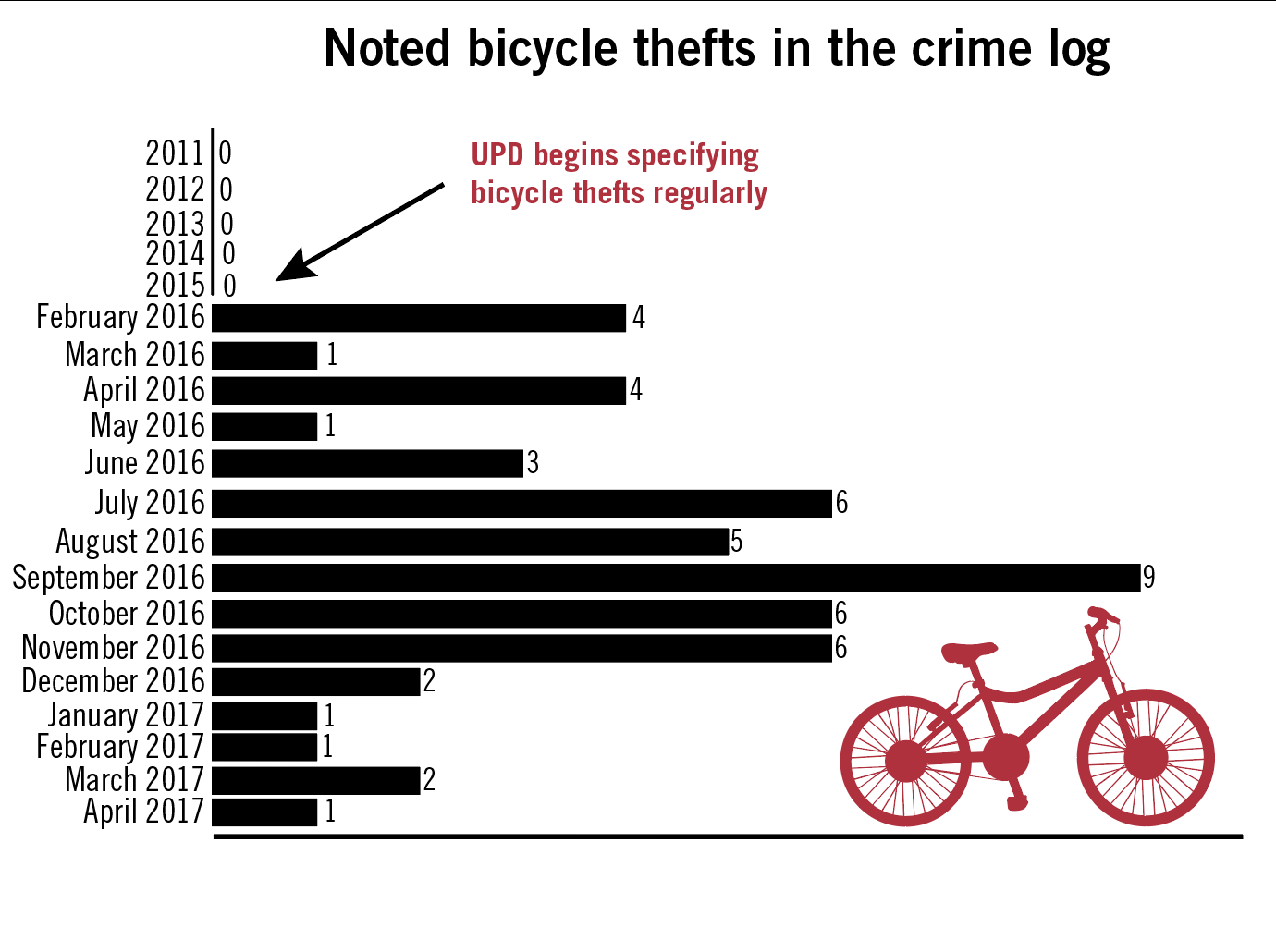
Bailey Ham | Hatchet Designer
Source: Crime Log
The University Police Department has changed how it classifies crimes to spotlight certain offenses on campus.
UPD began distinguishing thefts that involved bicycles from other larceny crimes and separating possession of drug reports from other drug law violations in the department’s crime log last year. University spokeswoman Maralee Csellar confirmed Wednesday that the department made the changes to be more clear about the type and frequency of these crimes.
The crime log now uses the term “possession of drugs” to specify when an individual has “more illegal drugs” in their possession, Csellar said. She said that a drug violation refers to the possession, sale or use of a controlled substance or narcotic.
There have been six possession of drug reports to UPD so far this year, compared to 20 drug violations.
Possession of drug reports began regularly appearing in the crime log last October, but two cases were also reported in December 2015.
Csellar declined to say when UPD began using the possession of drugs term. She also declined to say why the term was used in December 2015, but not again until October 2016.
A student was charged with possession of drugs after being found with 200 pills containing controlled substances in February. UPD also reported possession of drugs after finding marijuana in a residence hall room in January.
Three of GW’s peer schools – Emory, Southern Methodist and Duke universities – separate marijuana possession from drug possession in general.
UPD also started noting when a theft specifically involved a bicycle in the crime log as opposed to a general theft. UPD has reported 52 bicycle thefts making up almost 14 percent of all reported since UPD began logging those cases.
Csellar said the change happened this semester, but bicycle thefts began appearing in the crime log in February 2016.
“GWPD routinely reviews and make enhancements to public documents such as the annual security report and the department’s crime log to provide clear and concise information to the public,” she said.
Five instances of bicycle thefts have been reported so far this year compared to 47 all of last year.
UPD also separates thefts from motor vehicles, which make up almost 3.5 percent of the reported thefts since February 2016. Theft is defined as the unlawful taking, carrying, leading or riding away of another person’s property in UPD’s 2016 security report.
Out of GW’s 14 peer schools, Northwestern and Tulane universities specify when thefts involve bicycles. Northwestern has recorded seven bicycle thefts since February with none documented from February 2016 to January 2017. Tulane reported 6.5 bicycle thefts per month in the last six months.
Experts said police departments that publicize data about specific crimes may be better equipped to prevent those offenses.
Chuck Drago, a former police chief in Fort Lauderdale and a police practices expert, said specifying bike thefts as opposed to any other theft can make the community more aware of the risk from leaving bikes unattended and could help prevent those incidents.
“Police departments can follow up and react to crime, but we’re a lot better off if we prevent it from happening,” he said. “Sometimes the best people to prevent the crime from happening is the community itself. If the community members are going to do that, they have to know the information.”
Although universities are required by federal law to list crimes reported to campus police departments, Drago said some schools can be hesitant to provide additional details for fear of making the campus seem unsafe. He said departments looking to reduce crime will publish crime statistics anyway to educate the campus community about safety and crime prevention.
“It’s much more helpful to put this information out,” Drago said.
Chris McGoey, the president of McGoey’s Security Consulting firm, said police departments may break crimes into subcategories to analyze specific crime patterns, like how many bicycle thefts are occurring and where. He said the department may want to study the amount of bicycle thefts because it may be a common crime in the area.
“If you know that the bicycle thefts are occurring at one part of the campus or near a parking structure or near the dorms, they could focus crime prevention efforts in those areas,” he said.
McGoey said some police departments in the past have reclassified their crimes to try to make the number of crimes look smaller and their area look safer.
“You really have to report accurately, so you can really get your arms around what’s actually occurring, where and when and then hopefully put some program in place to reduce the number of offenses,” he said.
Robin Eberhardt and Blake Snyder contributed reporting.




